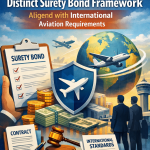linkedin.com/in/shadrachswantekambai

Upholding Ethical Behavior for Airline Personnel in Nigeria: Ensuring Safety, Efficiency, and Profitability
According to CIPD (2022), ethical behavior among airline personnel in Nigeria is not an abstract ideal; it is a concrete necessity. It is a linchpin for safety, efficiency, and profitability in the aviation sector. The tragic history of plane crashes in Nigeria reminds us of the dire consequences that can result from unethical decisions. As the nation’s aviation industry continues to grow, a commitment to ethical behavior is not just a moral choice but also an economic imperative for a safer, more efficient, and profitable future in Nigerian aviation. The airline industry is pivotal in Nigeria’s economic development and connectivity. However, ensuring this sector’s safety, efficiency, and profitability relies heavily on the ethical conduct of airline owners and their personnel. Also, ethical behavior is not just a moral imperative; it is also a critical factor in preventing accidents and promoting a thriving aviation industry. In this article, we will explore why ethical behavior is of paramount importance in the Nigerian airline industry and how unethical decisions have tragically led to plane crashes Benton (1995).
The Nexus of Ethics and Aviation Safety
The safety of the aviation industry depends on the ethical and professional conduct of the people involved in the industry, yet the topic of ethics is strangely absent in the curricula of many university aviation programs. However, safety is unquestionably the foremost concern in aviation. Lives are at stake, and any deviation from ethical conduct can lead to catastrophic consequences. Here’s why ethical behavior is pivotal for safety in the Nigerian airline industry:
Maintenance Standards:
In the realm of airline operations, ethical behaviors and maintenance standards are inseparable pillars of safety and integrity. Ethical conduct in this context entails a commitment to upholding rigorous maintenance procedures, transparency in maintenance reporting, and adherence to industry regulations. This ethical foundation not only ensures the safety of passengers and crew but also safeguards an airline’s reputation and viability. In a high-stakes industry where lives are at risk, ethical behavior in maintaining aircraft is not merely a choice; it is a non-negotiable imperative that underpins the trust, credibility, and long-term success of airlines worldwide. Unethical practices such as cutting corners in aircraft maintenance, using substandard parts, or neglecting necessary repairs can compromise the safety of flights. Ethical maintenance practices ensure that aircraft are at optimal.
Ground Staff and Pilot Competency
Ethical conduct in aviation is critical for ensuring safety and efficiency. Pilot competency, rooted in ethical training and decision-making, is pivotal in preventing accidents. Additionally, addressing ground staff concerns through ethical practices fosters a culture of safety reporting, ultimately enhancing aviation safety. This abstract highlights the interconnectedness of ethical behaviors, pilot competency, and ground staff engagement in maintaining the highest standards of safety and operational excellence within the airline industry
Regulatory compliance:
involves strict adherence to aviation regulations and safety protocols, which are non-negotiable for the industry’s success. Both ethical behaviors and regulatory compliance are intrinsically linked, fostering a culture of responsibility and safety, ethical behaviors and regulatory compliance are vital aspects of airline operations. Ensuring the highest standards of integrity within the industry is paramount for passenger safety and trust. Ethical behaviors encompass transparency, honesty, and accountability in all facets of airline operations, from maintenance to crew management.. Airlines that prioritize these principles not only enhance passenger confidence but also contribute to a safer and more sustainable aviation sector.
Reporting Safety Concerns:
: In airline operations, ethical behaviors and the reporting of safety concerns are integral to ensuring passenger safety. Ethical conduct among personnel, encompassing maintenance standards, pilot competency, and regulatory compliance, directly impacts the industry’s safety record. Encouraging a culture where employees feel empowered to report safety concerns without fear of reprisal is essential. This abstract highlights the critical link between ethical behaviors and safety reporting, emphasizing that upholding ethical standards is paramount in preventing accidents and maintaining the trust and well-being of passengers in the airline industry.
How to Handle Unethical Behaviors among Airline Employees in Nigeria.
Ethics Training and Education:
Implement comprehensive ethics training programs for all airline personnel. These programs should emphasize the importance of ethical conduct, and the potential consequences of unethical behavior, and provide clear guidelines on what is considered ethical within the industry. Regular refresher courses can help reinforce these principles.
Establish a Whistleblower Program:
Create a confidential and accessible reporting system where employees can safely report unethical behavior without fear of retaliation. Ensure that these reports are thoroughly investigated, and appropriate action is taken against wrongdoers. Protect whistleblowers’ identities to encourage reporting.
Leadership Accountability:
these imply Holding leaders and management accountable for fostering an ethical culture within the airline. Leaders should lead by example, demonstrating their commitment to ethical behavior. Implement a zero-tolerance policy for unethical conduct among management and provide consequences for violations.
Regular Audits and Oversight
Airlines must conduct regular audits and oversight of airline operations to detect and prevent unethical practices. Independent audits can help identify areas of concern, such as maintenance standards or procurement processes. Ensure that audit findings are acted upon swiftly to rectify issues and maintain ethical standards.
Conclusion
By understanding the unethical behaviors and implementing these strategies, airlines in Nigeria can create a culture of ethics, accountability, and transparency, ultimately reducing unethical behaviors among their staff and promoting safety and trust within the industry.
Reference
Benton, P. (1995). Ethics in Aviation Education. Journal of Aviation/Aerospace Education & Research, 5(2). https://doi.org/10.15394/jaaer.1995.1147
CIPD. (2022, August 24). CIPD | On this page. CIPD. https://www.cipd.org/en/knowledge/factsheets/ethics-role-hr-factsheet/#:~:text=Ethical%20practice%20is%20the%20application













I would like to thank you for the efforts you have put in penning this website. Im hoping to view the same high-grade blog posts from you later on as well. In fact, your creative writing abilities has inspired me to get my own, personal website now 😉
My brother suggested I might like this blog. He used to be totally right.
This put up actually made my day. You can not imagine just how so much time I had spent
for this info! Thanks!
We’re delighted that you found pleasure in reading our articles.